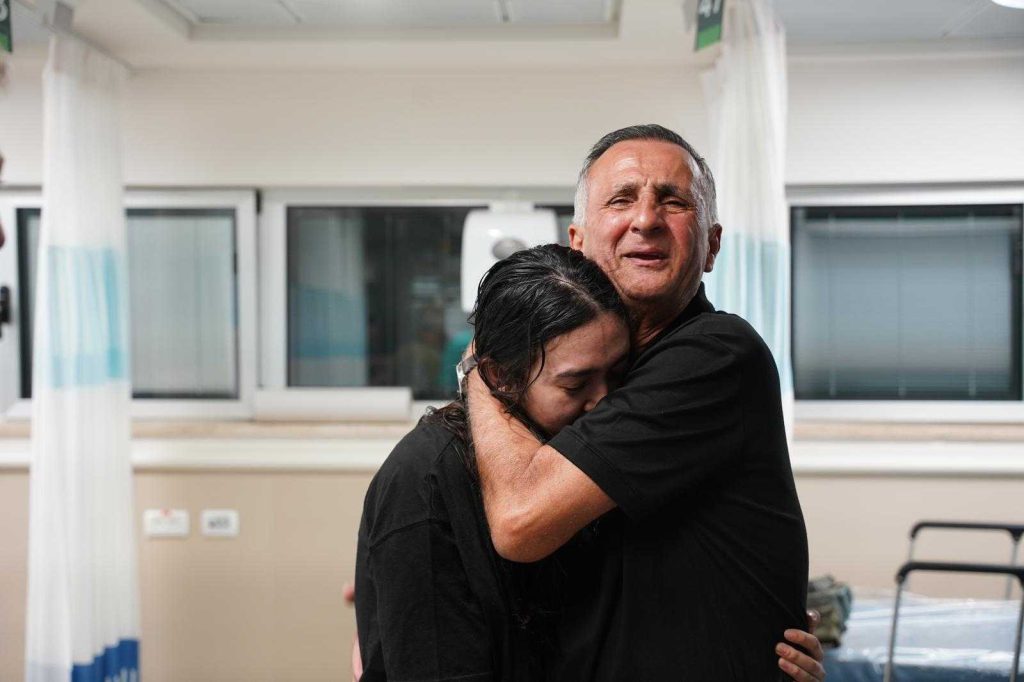
Overview
- Israeli forces managed to rescue 4 hostages from captivity after 8 months in a bold and unprecedented operation in the heart of the Nuseirat refugee camp. The operation involved the combined efforts of hundreds of personnel from the IDF, Shin Bet and the Police’s elite counterterrorism unit, Yamam.
- In a controversial move drawing parallels between Jihadist extremists and a democratic state, Israel, Hamas and the Palestinian Islamic Jihad have been added to the United Nations’ so-called “list of shame,” which is attached to an annual report released by UN Secretary-General’s office that documents alleged rights violations against children in armed conflict.
- According to Egypt and Qatar, Yahya Sinwar and the Hamas leadership have not accepted President Biden’s ceasefire proposal.
- IDF struck a group of Hamas terrorist from the elite “Nuhba” commando force, in central Gaza camp of Nuseirat.
- IDF conducted an airstrike on a Hamas command center that had been set up in an UNRWA school.
- The 162nd Division captured the Nuseirat camp and reached the Mediterranean coast, leading to the fall of the entire Philadelphi Route to the IDF.
- Major escalation in the North, as Hezbollah fired more UAVs, mortars and missiles than before. May was the most violent month of the war on the Northern front.

International
- Representatives of the Palestinian factions (with an emphasis on Fatah and Hamas) are scheduled to convene in Beijing for a reconciliation summit under Chinese auspices.
- For the first time in eight months since the war began, Israeli Foreign Minister Israel Katz spoke with Russian Foreign Minister Sergey Lavrov. They discussed the situation in the Middle East, with a focus on the Israeli-Palestinian conflict.
- Chile has joined the lawsuit against Israel at the International Court of Justice in The Hague.
- The Spanish Foreign Minister announced that his country would join South Africa’s lawsuit against Israel in the International Court of Justice, accusing Israel of genocide in Gaza.
- The Palestinian Authority has requested to join South Africa’s lawsuit against Israel for violating the Convention on the Prevention of Genocide.
- Countries, including the US, UK, Canada, and Germany, issued a joint statement calling on Hamas to accept the hostage deal proposed by President Biden, leading to a permanent ceasefire. The statement is also signed by leaders of Argentina, Austria, Brazil, Bulgaria, Colombia, Denmark, Poland, Portugal, Romania, Serbia, Spain, and Thailand, according to the White House.
- The US State Department announced that it would impose sanctions on the terrorist organization “Lion’s Den,” operating in Nablus.
- CNN reported that the United States is urging Qatar to declare the expulsion of Hamas leadership from its offices in Doha if it does not accept the hostage deal. After months of stating it would do so, Qatar is now threatening Hamas leadership with expulsion from its territory.
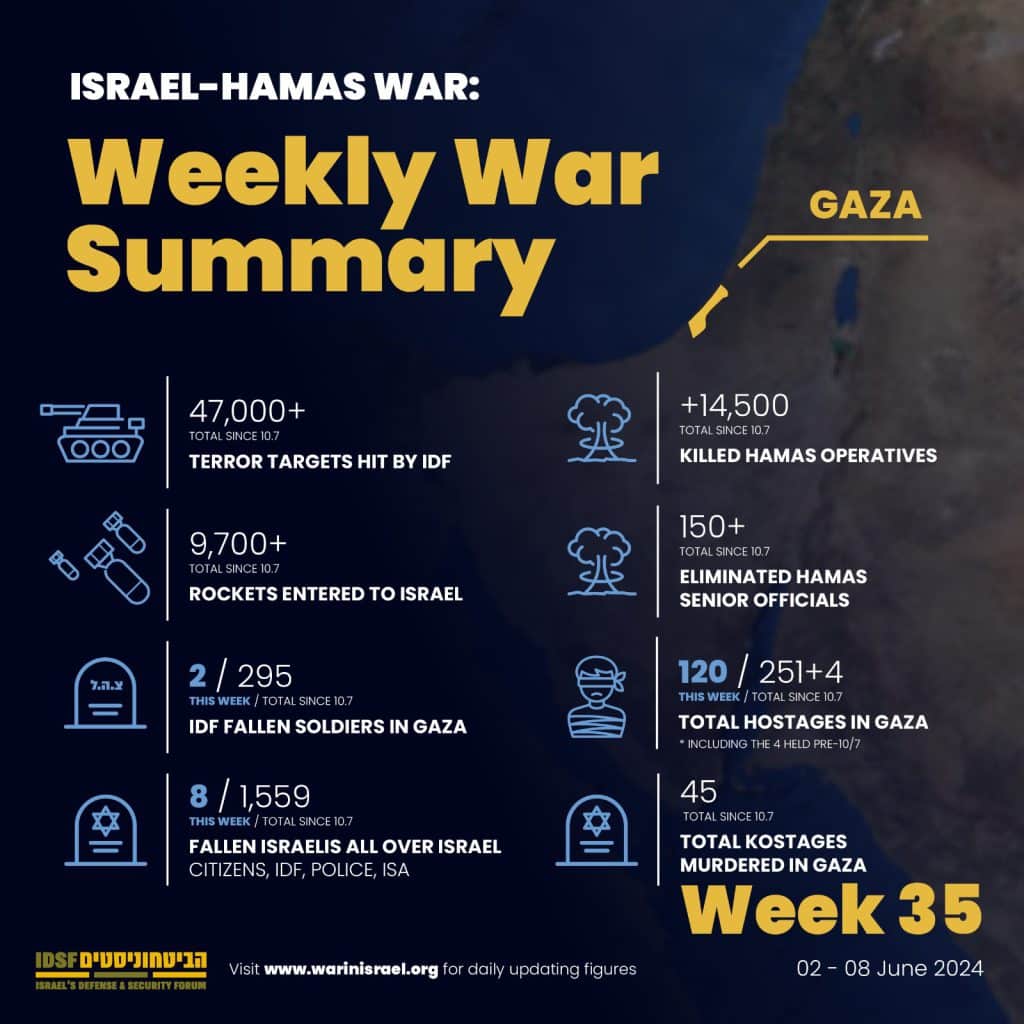
Gaza Strip
Diplomatic
UN adds Israel to “List of Shame”
Israel, Hamas and the Palestinian Islamic Jihad have been added to the United Nations’ so-called “list of shame,” which is attached to an annual report released by UN Secretary-General’s office that documents alleged rights violations against children in armed conflict.
This is the first time that Israel and Hamas have been included on this list, joining the ranks of Russia, the Islamic State, al-Qaeda, Boko Haram, Afghanistan, Iraq, Myanmar, Somalia, Syria and Yemen. Israel is believed to be the first democratic country included on the list.
“I am utterly shocked and disgusted by this shameful decision,” UN Ambassador Gilad Erdan said in a statement.
Israeli Prime Minister Benjamin Netanyahu posted on his X social media account that the UN had “added itself to the blacklist of history when it joined those who support the Hamas murderers.”

The Hamas Hostage Deal
According to Egypt and Qatar, Sinwar and the Hamas leadership have so far not accepted President Biden’s ceasefire proposal. The CIA director has arrived in the Middle East to persuade Egypt and Qatar to increase the pressure on Hamas. The reason for Hamas’s not accepting the proposal is the belief that they can negotiate a better deal and that time is on their side as indicated in interviews by Hamas officials and other reported sources.
Hamas leaders believe that US pressure is directed mainly at Israel and as Israel continues to lose international support it would lead to more substantial Israel concessions– mainly the survival of Hamas in Gaza and an end to the war.
The current proposal is vague in its wording, allowing Israel to resume attacks within the initial six-week phase and the release of several dozen hostages.
The United States distributed a draft to all members of the UN Security Council ahead of a vote. According to the draft, Biden’s proposal to end the war involves three stages:
- A six-week ceasefire with the release of an unspecified number of hostages (a concession to Hamas from previous proposals which allows for the transfer more dead Israeli bodies than live hostages) and security prisoners. The IDF will withdraw from urban centers (which is not defined ), displaced persons can return to the northern part of the Gaza Strip, and humanitarian aid will flood the region. Critically, there is no guarantee as to the number of living hostages, not bodies, that Hamas will be committed to release in this phase.
- In the second phase, it will be guaranteed that Israel will not return to fighting (even if Hamas renews its attacks), will withdraw from the entire Gaza Strip, and the parties will discuss a permanent ceasefire.
- In the third phase, all hostages and the bodies of hostages will be released in exchange for a multi-year plan for the rehabilitation of the Gaza Strip.
The proposal implicitly accepts the survival of Hamas and does not allow Israel to accomplish its war aim of destroying Hamas as a military and governing entity as well as release its hostages (Hamas would always try to keep hostages as bargaining chips).
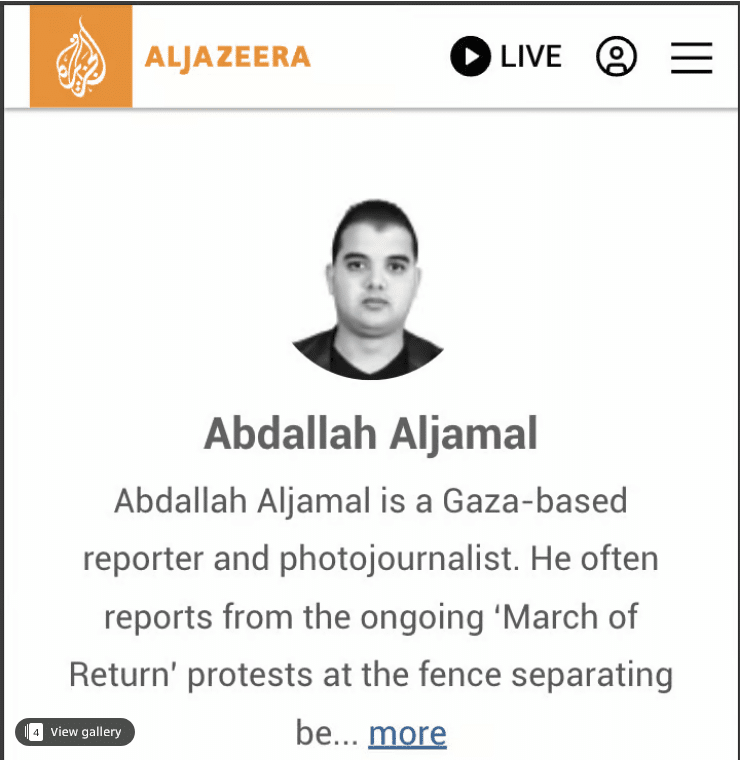
Additionally, the proposal includes two clauses: one, ensuring no reduction of the Gaza Strip’s territorial area (which means Israel could not maintain the necessary security buffer zones it created) or any demographic changes (i.e., encouraging emigration), and the other a political process for establishing a Palestinian Arab state both in the Judea and Samaria and the Gaza Strip.
A ceasefire would essentially end the war and result in a new status quo, while for Israel, the only acceptable outcome should be complete operational control of Gaza for the time being and dismantling Hamas’ capabilities.
- Biden stated that Hamas is currently the only obstacle to a ceasefire, and that Israel is ready for it and has even made far-reaching proposals, such as the release of hundreds of security prisoners. The Qatari foreign minister said on June 4th that they conveyed Israel’s proposal to Hamas.
- Senior Hamas official Mohammad Hamdan (based in Beirut) stated that they cannot accept a deal that does not include the end of the war and a full IDF withdrawal from the Gaza Strip. The terrorist organization fears that once the initial six-week phase ends, Israel will resume fighting to destroy them. They are placing their hopes on Hezbollah in the north and Iranian pressure.
- The American draft proposal for a ceasefire presented at the UN is currently being rejected by Russia, China, and Algeria due to the ambiguity in transitioning from the first to the second phase of the hostage deal. The Biden administration is pressuring Turkey, Qatar, and Egypt to press Hamas to accept the ceasefire. Qatar and Egypt have threatened asset freezes, sanctions, arrests, and expulsions from Qatar against Hamas leaders to agree to the current deal. Nonetheless, Ismail Haniyeh declared that following Sinwar’s decision, it would not be accepted.
- The CIA director arrived in Doha to meet with Egyptian and Qatari representatives and stated that only in the third week will discussions on the second phase begin, and only in the fifth week will there be an agreement on whether to proceed to that phase.
- This week, Secretary of State Blinken is expected to arrive in the Middle East to visit Egypt, Israel, Jordan, and Qatar to expedite the deal and bring about calm on the northern front, tying both Gaza and Lebanon into one agreement.
- The US does not believe that Israel can eradicate terrorism in the long term in the Strip or manage it alone. Therefore, a reformed Palestinian Authority would need to take the reins of governance in the area. Furthermore, for the sake of normalization with Saudi Arabia and a coalition against Iran, it would recognize a Palestinian Arab state as part of a broad security arrangement.
Operational
IDF Rescue Operation
Israel managed to rescue 4 hostages from captivity after 8 months in a bold and unprecedented operation in the heart of the Nuseirat refugee camp. The operation involved the combined efforts of hundreds of personnel from the IDF, Shin Bet and the Police’s elite counterterrorism unit, Yamam. Using precision intelligence, the operation began with heavy bombardment from air, sea and land. The hostages were located in civilian families’ homes, that were paid by Hamas to hold them, while using the densely packed area of the adjacent Nuseirat market as human shields. The hostages were kept in 2 separate homes, 200 meters apart. The operation took place simultaneously in both houses to avoid a scenario where the captors would kill hostages once they became aware of the rescue attempt.

There were reportedly many civilian deaths, which should not be surprising, considering that Hamas arranged for civilians to be holding the Israeli hostages in a very densely packed environment. According to the IDF, the rescue forces faced a massive amount of gunfire and RPG fire (with a wide lethal radius) in Nuseirat, leading the ground troops and the Israeli Air Force to carry out major strikes in response. These riots around the forces and hostages put a real and present danger to their lives.
The strikes, targeting the areas from where Hamas operatives were opening fire, were aimed at protecting the rescue forces and the hostages. Hamas is trying to label this incident as a massacre, to try to distract from their own failure of losing 4 hostages and the fact that the endangered thousands of Gazans by their reckless use of the entire area as human shields – some willing and others unwilling.
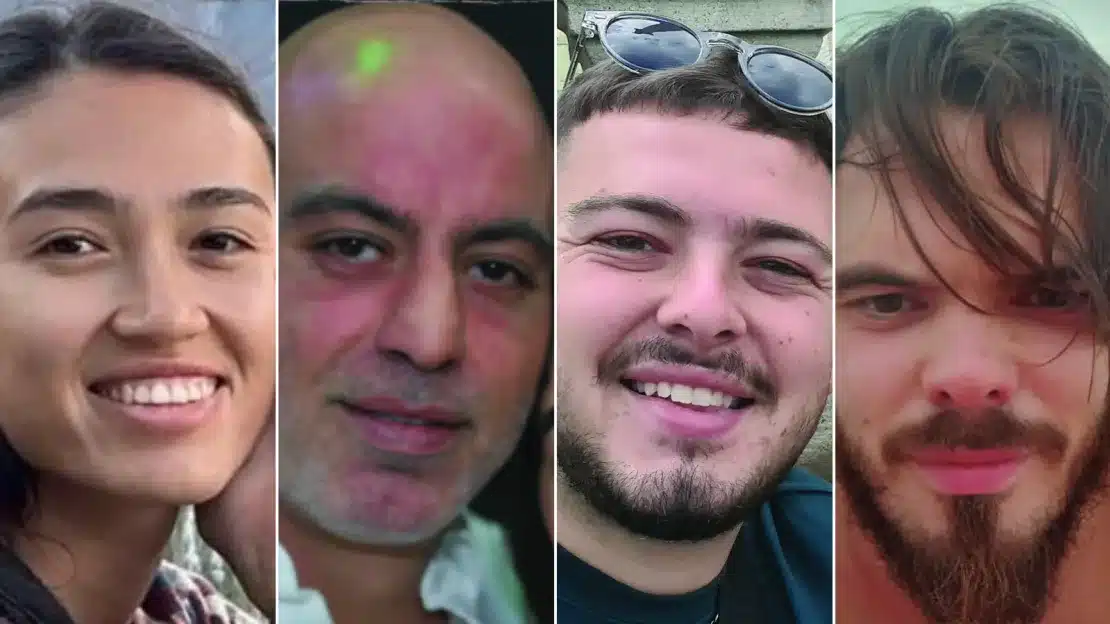
This is the most complex, daring, bold and successful hostage rescue operation since the start of the war and was carried out in broad day light.
The operation was known originally as “Seeds of Summer,” but waschanged to “Operation Arnon” after Yamam officer Chief Inspector Arnon Zmora who led the mission and was injured, succumbed to his wounds and died.
The announcement of the rescue of hostages sent an outburst of happiness in Israel and the hope to rescue more hostages alive this way. This could also contribute to Israel’s strategic stance during negotiations over the hostage deal with Hamas, while using the chip of a military rescue option.

The IDF later revealed that Almog Meir Jan, Andrey Kozlov, and Shlomi Ziv were held by the family of Abdallah Al Jamal (Al Jazeera journalist) and his physician father, Dr. Ahmed Al Jamal. Al Jamal was an operative of Hamas. This only shows how much civilians are involved in the warfare against Israel and collude with Hamas.
UN School Incident in Nuseirat
On Thursday, June 6th the IDF struck a group of Hamas terrorist from the elite “Nuhba” commando force, in the central Gaza refugee camp of Nuseirat. Some of the terrorists targeted had participated in the October 7th massacre. The terrorists were ensconced in a UN school hiding in 3 classrooms. The IDF used precise munitions to avoid civilian casualties. Within minutes Hamas and UNRWA characterized the incident as a massacre providing figures of 35-45 “civilian” who died.
IDF Spokesman Rear Adm. Daniel Hagari in an evening press conference said the military had identified at least 17 Hamas and Palestinian Islamic Jihad operatives killed in the strike, including those responsible for Hamas and Islamic Jihad’s air defense system.
This incident was misleadingly described in some media outlets as an “airstrike on a school” that “killed multiple Palestinians”, while failing to mention that Hamas terrorists entrenched themselves in the compound, and apparently no civilians were present in the premises.

UN School in Shati
On Friday, June 7th , the IDF conducted an airstrike on a Hamas command center that had been set up in a UNRWA school, (Asmaa school) in Gaza City’s Shati neighborhood.
Attempted infiltration
The IDF eliminated three terrorists who attempted to cross into Israel from the Rafah area in the southern Gaza Strip. This is the first incident in which there was a real threat of infiltration since October 7th. The IDF had created a security buffer zone near the fence and the terrorists were only able to approach so close to the border because they emerged from a tunnel shaft a mere 200 meters from the border. Troops of the Desert Reconnaissance Battalion, made up of Bedouin soldiers were dispatched to the scene.
One soldier, Warrant Officer Zeed Mazarib, 34, a tracker in the Gaza Division’s Southern Brigade, an Arab Bedouin was killed in the exchange.
Rafah
- So far Israel has heeded to US requests to avoid a full-blown maneuvering operation in Rafah and has limited itself to localized raids based on intelligence. Division 162 is operating on the Philadelphi corridor finding more tunnels and tunnel shafts as well as weapon depots every day.
- After locating several shafts leading to an exceptionally long tunnel route, the Yahalom unit destroyed a branched route with a total length of 2 kilometers. The process of destroying the underground infrastructure in the area and beneath the route is far from complete.

Other
- The US pier has been repaired and reinstalled on the Gaza shoreline. The IDF has agreed to take responsibility over its operation.
- In one of the raids in recent weeks, the IDF found weapons in a baby’s cradle.
- The Israeli military reached the coast of southern Gaza’s Rafah, completing its control over the so-called Philadelphi Corridor and establishing “operational control”.
- The 98th Division achieved operational control east of Deir al-Balah and the Bureij refugee camp.
- The 99th Division led an operation in the southern neighborhoods of Gaza City, focusing on the Sabra neighborhood. The operation included targeted raids based on intelligence with air force support. Dozens of terrorists were eliminated, over 70 terrorist infrastructures were destroyed, and in cooperation with the Yahalom unit, a tunnel route with a total length of 1.5 kilometers and a depth of 23 meters was destroyed.
- One of the heads of Hamas’s General Security apparatus in the Rafah area, responsible for policing and ensuring Hamas’s survival in the aftermath, was eliminated in an airstrike.
Domestic Arena
War cabinet member Benny Gantz’s ultimatum for the government to present “A Dday Aafter Plan for Gaza” was scraped on the last day of the deadline, Saturday, June 8th. Gantz decided to cancel a press conference planned for the evening, during which he was expected to announce his National Unity party was leaving the government.
This decision comes amidst the successful rescue operation of the 4 hostages and Prime Minister’s Netanyahu’s request on X that he remains in the government as unity is what the country needs.
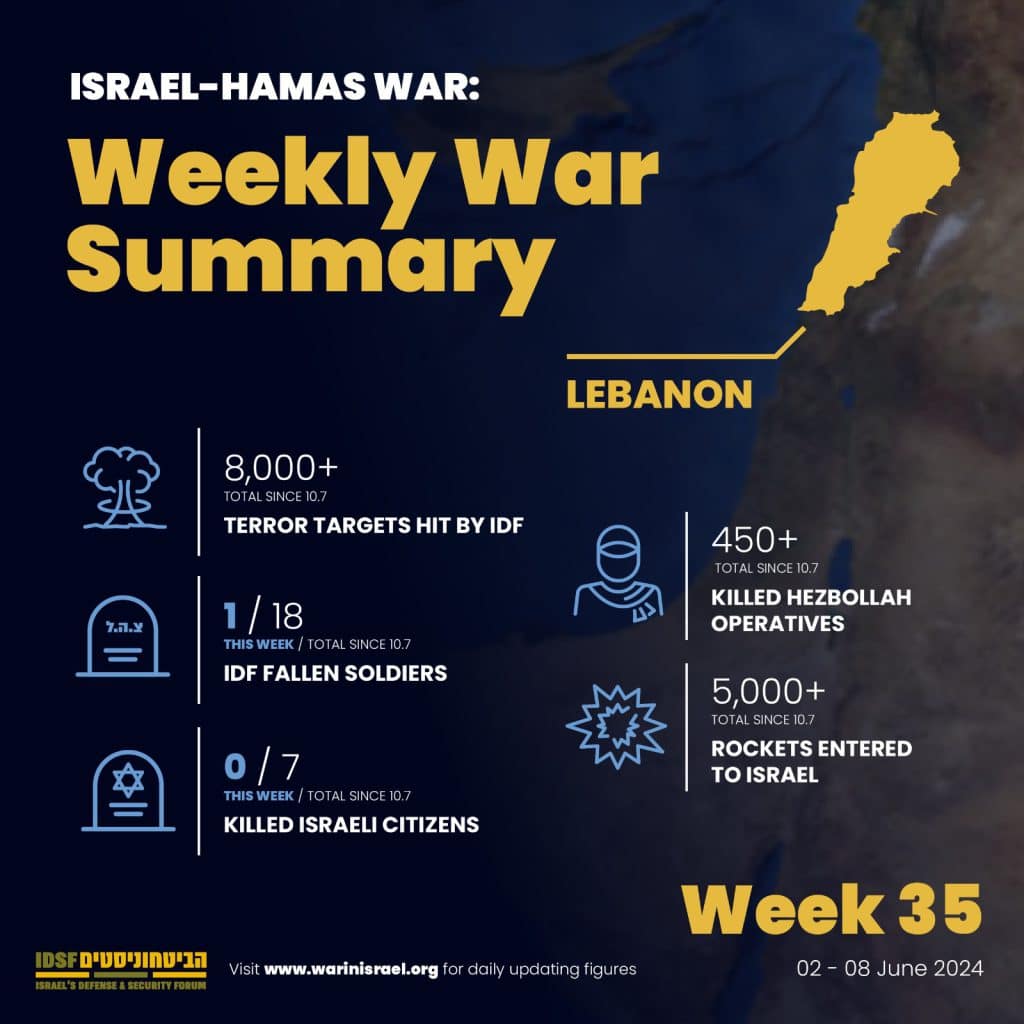
Lebanon
Operational
Major escalation in the North, as Hezbollah fired more UAV, mortars and missiles than before. Israeli media concentrated on the large fires that were caused in the North by Hezbollah’s attacks and the warm weather. Firefighters have put out a fire that destroyed over 14 square kilometers of forests.
May 2024 marked the peak intensity of Hezbollah attacks against Israel since October 2023, with 325 attacks. The daily average of attacks was ten per day, compared to 238 attacks in April, averaging 7.8 per day. In terms of the weapons used by Hezbollah, May saw a significant increase in the use of anti-tank missiles and UAVs, doubling what was used in April:
- Anti-tank: 95 incidents in May, compared to 50 in April.
- UAVs: 85 UAV penetration incidents in May, compared to 42 in April.
- Since the beginning of the war, Hezbollah has carried out 1,964 attacks (not missiles) on the northern border, 46% of which targeted civilian infrastructure and areas.
- In one of the attacks on the Druze village of Hurfeish, 12 civilians were injured (including some in serious condition) following a double attack, meaning a UAV hit and caused injuries, and upon the arrival of first aid and rescue forces, a second UAV struck. A reserve soldier was killed as a result of Hezbollah’s attacks, and another soldier was seriously injured. Beyond the attacks aimed at causing fires, Hezbollah is demonstrating the capability of gathering quality and reliable intelligence and translate that into carrying out precise attacks that the Israeli air defense system fail to intercept.
- A UAV was intercepted near Nof HaGalil, marking a 35-kilometer-deep attack.
Diplomatic
Despite the efforts of the US and France to mediate a ceasefire agreement between Israel and Hezbollah, including pushing the terrorist organization 10 kilometers from the border or even north of the Litani River, Hezbollah has refused so far and has intensified its attacks. Nasrallah’s deputy, Naim Qassem, declared yesterday that they are ready for a full-scale war against Israel and will cause extensive destruction and numerous refugees with their stockpile of missiles and rockets.
- Prime Minister Netanyahu had a phone conversation with French President Emmanuel Macron regarding a hostage deal, the humanitarian situation, Israel’s determination to destroy Hamas, and the situation on the northern front.
- It was reported that Washington is pressuring Jerusalem to avoid launching a war in southern Lebanon, even if limited in scope, and that Israel should not harbor illusions that it can limit it in time and place. Such a war poses risks to the Israeli home front and could escalate into a regional conflict with the influx of Shia militias from Syria and Iraq into Lebanon, extensive firing from Syria and Iraq against Israel and American bases, increased fighting with the Houthis in the maritime arena, etc. From the US perspective, they believe that Israel could reach an agreement with Lebanon and Hezbollah while simultaneously achieving a ceasefire in Gaza to return to regional affairs, namely curbing China’s and Iran’s ambitions and building an Israeli-Arab coalition. It remains difficult to see how Israel can provide security to its northern region and encourage its 80,000 residents who have fled their homes, while Hezbollah remains focused on Israeli’s destruction and maintains the ability to cause extensive damage to Israel regardless of diplomatic agreements.
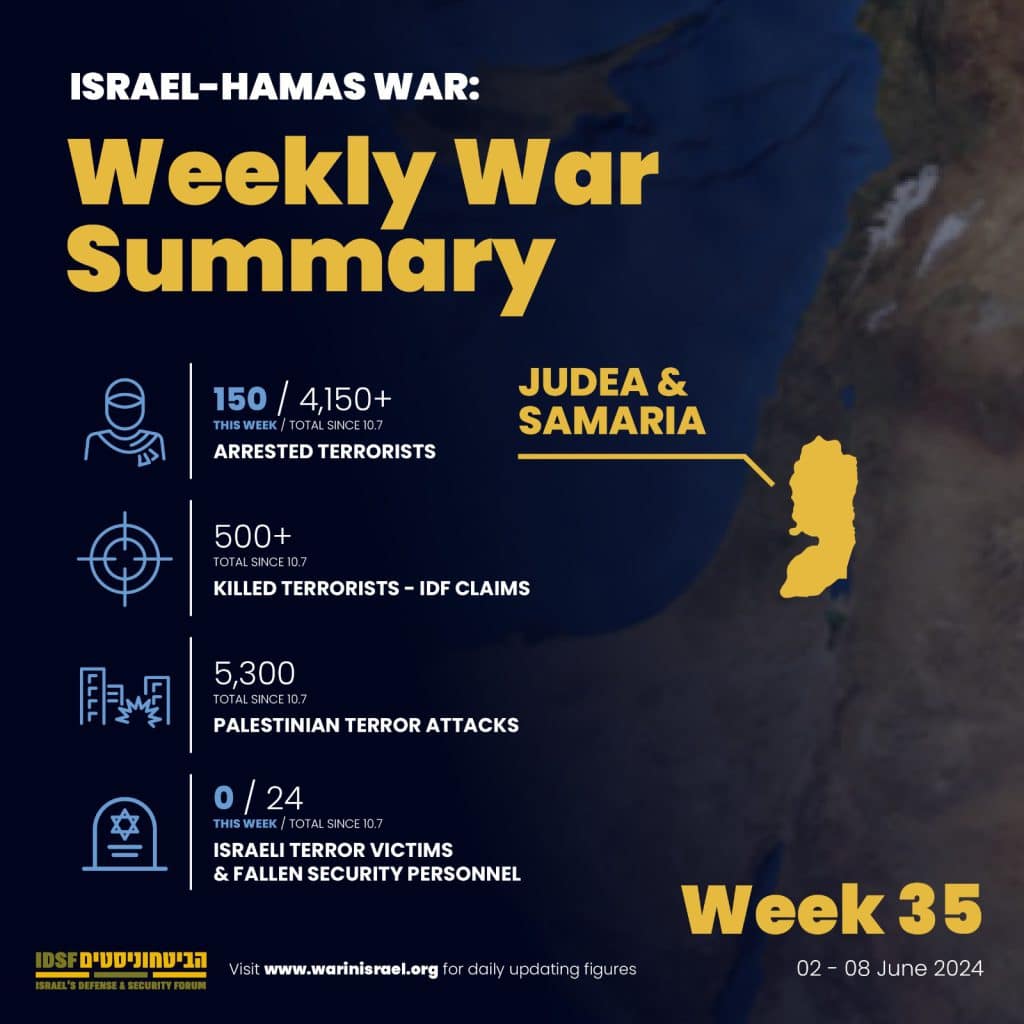
Judea and Samaria
- Since the beginning of the campaign, 4,150 wanted individuals have been arrested in the Judea and Samaria, including 1,750 Hamas operatives.
- Defense Minister Yoav Gallant held a situation assessment along the seam line near Tulkarm and ordered the establishment of a rapid intervention force in the Sharon area to counter potential terrorist attacks as the threat of infiltration became more apparent with an attempted infiltration last week and shooting at Israeli communities.
- In recent months, security forces have thwarted a Hamas bombing attack in central Israel, directed by the organization’s headquarters in Turkey.
- Abu Mazen’s office responded to the statements of Iran’s Supreme Leader Khamenei, who said that the war was necessary for the region and that there should be no hope in a ceasefire agreement in Gaza. The office’s statement said that Palestinians are paying the price of the war and emphasized that Palestinians do not need unnecessary wars but rather policies that serve their national goals without destroying them.
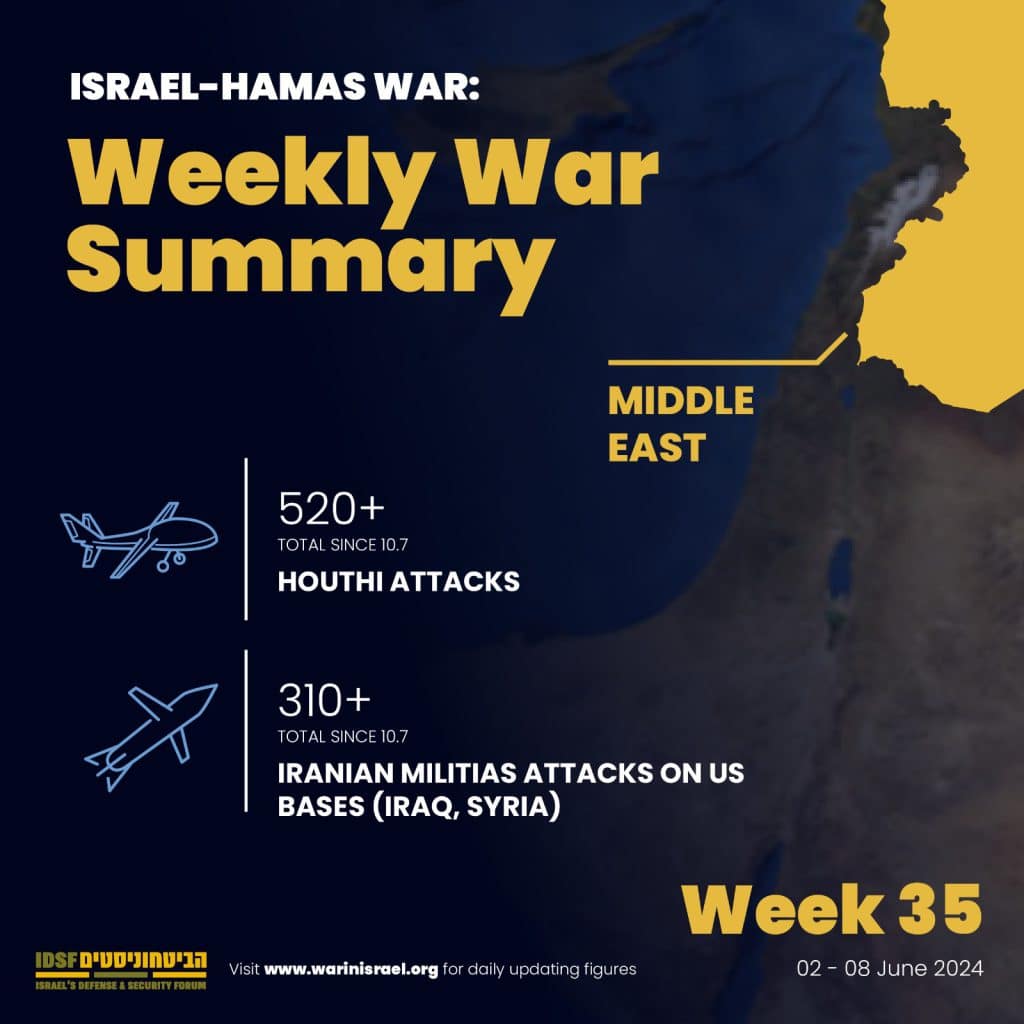
Egypt
In Cairo, a tripartite meeting involving Egypt, Israel, and the United States was held concerning the Rafah border crossing, which has been closed since the IDF took control of the Gazan side of the crossing about a month ago. A senior Egyptian source stated that Egypt emphasized its consistent stance on the need for an Israeli withdrawal from the Palestinian side of the Rafah crossing for it to be operational again.
Yemen
One of the most significant operations this week was the attack on the American aircraft carrier Eisenhower twice in the northern Red Sea by the Houthis within 24 hours. The aircraft carrier Eisenhower was attacked using seven cruise missiles and four suicide drones. After the two attacks, the Eisenhower retreated northward in the Red Sea, fearing further attacks. The carrier was 400 km off the coast of Yemen during the attack, then moved about 880 km northwest of Jeddah. The attack on the Eisenhower was successful, and air traffic on the carrier was halted for two days after the attack.
- The Houthis detained 11 UN workers and aid workers. Six worked for the U.N.’s human rights agency, while one apiece worked for its special envoy’s office, its development arm, UNICEF, the World Food Program and UNESCO.
Iran
Iran Revolutionary Guards Corps Commander Salami threatened to attack Israel during the funeral of Sayyid Abyar, a general in the Revolutionary Guards who was killed in an airstrike in Aleppo on June 3rd. Salami declared that following the April 13th attack, there is a new method for Iranian attacks – direct attacks against Israel – and Israel should expect another attack in response to Abyar’s assassination. From now on, any attack on a target in Iran or an Iranian target in the Middle East will lead to a direct attack against Israel.
- On June 3rd, representatives of 10 Palestinian factions attended the 35th memorial ceremony for Khomeini in Tehran, with Hamas receiving Iranian support.
- According to Reuters, the United Kingdom, France, and Germany submitted a formal draft to the International Atomic Energy Agency’s Board of Governors, calling on Iran to cooperate with the IAEA and take “urgent and necessary actions” to explain uranium traces found at undeclared sites.
- Iranian Foreign Minister Ali Bagheri emphasized the need to continue President Raisi’s policy and dialogue with Egypt. Iranians understand Egypt’s importance in security cooperation and its vital role as a political leverage point on Israel or Hamas.
